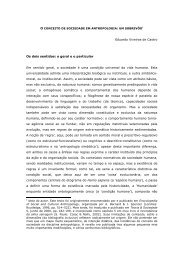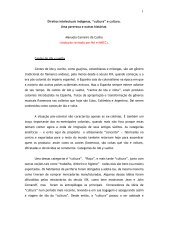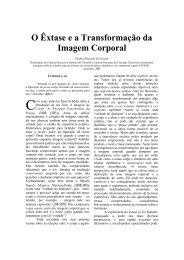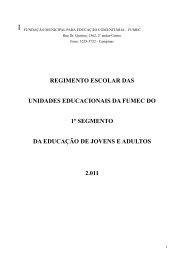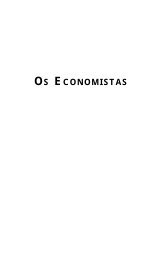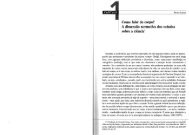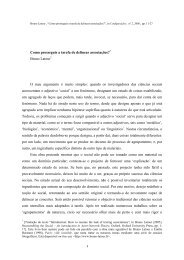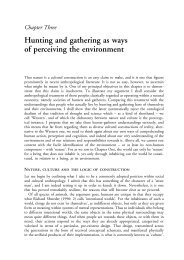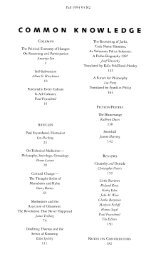Bruno Latour & Steve Woolgar - Laboratory Life ... - Pedro P. Ferreira
Bruno Latour & Steve Woolgar - Laboratory Life ... - Pedro P. Ferreira
Bruno Latour & Steve Woolgar - Laboratory Life ... - Pedro P. Ferreira
You also want an ePaper? Increase the reach of your titles
YUMPU automatically turns print PDFs into web optimized ePapers that Google loves.
econciliable through sociological explanation (Mulkay, 1976; but see <strong>Woolgar</strong>, 1976b).These comments on the problems involved in the use of scientists' accounts find a parallel indiscussions of the "craft" character of science. For example, Ravetz (1973) suggests that thenature of scientific activity is thoroughly misrepresented by the form of presentation which isused in the reporting of science. Not only do scientists' statements create problems forhistorical elucidation; they also systematically conceal the nature of the activity whichtypically gives rise to their research reports. In other words, the fact that scientists oftenchange the manner and content of their statements when talking to outsiders causes problemsboth for outsiders' reconstruction of scientific events and for an appreciation of how science is((29))done. It is therefore necessary to retrieve some of the craft character of scientific activitythrough in situ observations of scientific practice. More specifically, it is necessary to showthrough empirical investigation how such craft practices are organised into a systematic andtidied research report. In short, how is it that the realities of scientific practice becometransformed into statements about how science has been done? We regard the prolongedimmersion of an outside observer in the daily activities of scientists as one of the better waysin which this and similar questions can be answered. This also has the advantage that ourdescriptions of scientific activity have emerged as a result of the observer's experiences in thefield. In other words, we have not chosen consciously to focus predominantly on any one ofthe technological, historical, or psychological aspects of what is observed. No attempt wasmade to delimit the area of competence prior to our discussion, and there was no priorhypothesis about a concept (or set of concepts) which might best explain what was to beencountered in the field. Thirdly, our use of "anthropology" denotes the importance ofbracketing our familiarity with the object of our study. By this we mean that we regard it asinstructive to apprehend as strange those aspects of scientific activity which are readily takenfor granted. It is evident that the uncritical acceptance of the concepts and terminology usedby some scientists has had the effect of enhancing rather than reducing the mystery whichsurrounds the doing of science. Paradoxically, our utilisation of the notion of anthropologicalstrangeness is intended to dissolve rather than reaffirm the exoticism with which science issometimes associated. This approach, together with our desire to avoid adopting thedistinction between "technical" and "social,"leads us to what might be regarded as a particularly irreverent approach to the analysis ofscience. We take the apparent superiority of the members of our laboratory in technicalmatters to be insignificant, in the sense that we do not regard prior cognition (or in the case ofan ex-participant, prior socialisation) as a necessary prerequisite for understanding scientists'work. This is similar to an anthropologist's refusal to bow before the knowledge of a primitivesorcerer. For us, the dangers of "going native" outweigh the possible advantages of ease ofaccess and rapid establishment of rapport with participants. Scientists in our laboratoryconstitute a tribe whose daily manipulation and production of objects is in danger of being



